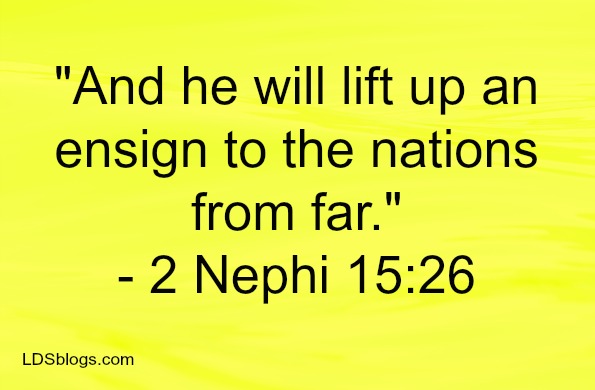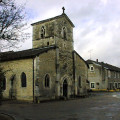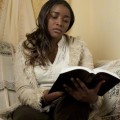Throughout history, symbols have been used on the battlefield to represent rallying points. In the Bronze age, field signs were used. During the iron age, war flags emerged in Asia. The first known standard used in ancient Rome is said to have been a handful of straw affixed to the top of a pole. In later years, the Roman standard evolved into a golden eagle perched on top of a staff with a banner waving underneath.
 In fact, the term standard is from an old Frankish word for field sign.
In fact, the term standard is from an old Frankish word for field sign.
Over time, standards became an important symbol of a nation’s freedom and rights. Those fighting under the standard were so converted to this symbolism that they would protect the actual standard with their life. One of Napoleon’s standard bearers is said to have continued holding his standard high even after losing both of his legs to cannon fire.
If the standard fell to the enemy, it meant defeat. It meant the end of life as that society knew it.
STANDARDS IN THE SCRIPTURES
In the scriptures, we read about standards too, although the name they have been given is ensign, another term for the same word.
In 2 Nephi 15: 26 we read:
“And he will lift up an ensign to the nations from far, and will hiss unto them from the end of the earth; and behold, they shall come with speed swiftly; none shall be weary nor stumble among them.”
2 Nephi 21: 10 says:
“And in that day there shall be a root of Jesse, which shall stand for an ensign of the people; to it shall the Gentiles seek; and his rest shall be glorious.”
In the Doctrine and Covenants, Zion is referred to as a standard in section 64:42–
“And she shall be an ensign unto the people, and there shall come unto her out of every nation under heaven.”
And what about the great Captain Moroni and his Title of Liberty? This story is a perfect illustration of just what a standard means to a group of people.
CAPTAIN MORONI SETS THE STANDARD
I know most of you have probably read this story in the Book of Mormon a dozen or more times, but here is a little refresher for those of us who need one:
In Alma chapter 46, we are introduced to a man named Amalickiah. It is said that he was large and strong and exceedingly wroth against Helaman and his brethren.
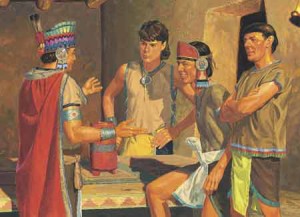 At this point in the history of the Book of Mormon, the prophet Alma has just departed out of the land of Zarahemla never to be seen again. He is replaced by his beloved son Helaman as the prophet, and Helaman sets out among the people declaring the word of God and preaching repentance.
At this point in the history of the Book of Mormon, the prophet Alma has just departed out of the land of Zarahemla never to be seen again. He is replaced by his beloved son Helaman as the prophet, and Helaman sets out among the people declaring the word of God and preaching repentance.
Enter Amalickiah. He and his friends, many of whom are members of the ruling body of the land, albeit lower judges and therefore not wielding much power, decide that they are not interested in hearing what Helaman has to say. In fact, Amalickiah is so not interested in repenting or hearing the word of God that he begins to believe that he himself should be king. It has been 19 years since the Nephites last had a king, instead being ruled over by a group of judges, and Amalickiah wants to change all that.
He sets about leading away the hearts of the people through flattering words and promises of power. Not only is he successful in convincing his friends that he should be the sole ruler over the Nephites, he begins to succeed in drawing faithful members of the church away from their beliefs.
Soon, Nephite society as a whole is in an uproar.
It is here that we are first introduced to Captain Moroni. We are told that he is the chief commander over the armies of the Nephites. As a military man who has given his life in the defending of the Nephites against the Lamanites, one can imagine that he was not very impressed with a radical upstart who is trying to destroy the Nephites from within.
What was so wrong with Amalickiah’s desire to be king?
The difference between being ruled by a king and being ruled over by a body of judges is simple–freedom.
A king is beholden to no one. He alone decides what goes and what doesn’t. He can decide who gets freedom and who has broken the law. But a group of judges who are elected by the voice of the people can keep one another in check and thereby not one person gets a decided say in the rule of law.
This is what Amalickiah was trying to change–who determines individual freedoms.
Captain Moroni was not interested in Amalickiah’s form of government. And he is about to raise an army standard to prove it.
“And it came to pass that he rent his coat; and he took a piece thereof, and wrote upon it–In memory of our God, our religion, and freedom, and our peace, our wives, and our children–and he fastened it upon the end of a pole.”
(Alma 46: 12)
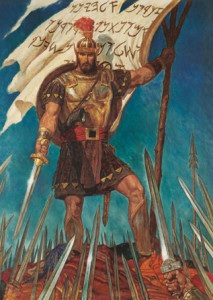 I find this very interesting in light of army standards. Captain Moroni rends his coat in a sign of mourning for a society that he loved enough to give his life for. As he says above, this was a society that allowed for himself and his family to worship their god and afforded peace for his family. He knows that if this society is abolished that this will not be the case for long.
I find this very interesting in light of army standards. Captain Moroni rends his coat in a sign of mourning for a society that he loved enough to give his life for. As he says above, this was a society that allowed for himself and his family to worship their god and afforded peace for his family. He knows that if this society is abolished that this will not be the case for long.
Remember that an army standard represents everything that a nation or a group of people stand for?
It is not until Captain Moroni puts on his full suit of armor and takes up his title of liberty–his standard–that he bows himself down to the earth and offers up mighty prayer unto God. Not only does he beseech God to protect the cause of Christians and freedom throughout the land, but he even lays out the very coordinates of the land that he is referring to.
“And it came to pass that when he had poured out his soul to God, he named all the land which was south of the land Desolation…all the land, both on the north and on the south–A chosen land, and the land of liberty.”
(Alma 46: 17)
What Captain Moroni is essentially doing here is declaring holy war. He has risen a standard, has put on his emblems of war–his armor–and has asked God to justify his efforts and keep his army from destruction unless “we bring it upon us by our own transgressions” (Alma 46: 18).
When Captain Moroni finishes his prayer, he takes his cause to the people.
“Behold, whosoever will maintain this title upon the land, let them come forth in the strength of the Lord, and enter into a covenant that they will maintain their rights, and their religion, that the Lord God may bless them.”
(Alma 46: 20)
He is asking others to join his army–to flock to his standard and to take an oath to protect their way of life.
And, oh, how they come!
“And it came to pass that when Moroni had proclaimed these words, behold, the people came running together with their armor girded about their loins, rending their garments in token, or as a covenant, that they would not forsake the Lord their God…”
(Alma 46: 21)
I love this so much. The people came running…running! They didn’t stop to think about it. In fact, they came already prepared to fight in their own armor and rending their own garments as an oath to God.
These are men that are not afraid to stand up for what they believe in, even if it is not popular. Even if it is uncomfortable. Even if it means going against society.
IS THERE A STANDARD TODAY?
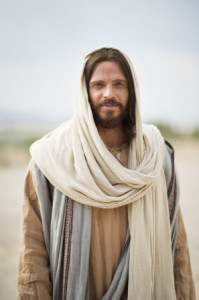
Do we find ourselves in scenarios like this in our day?
Are the values that we hold dear being eroded and degraded?
Has someone raised a standard for us?
Is there anything we can do?
It is true, if we are discerning, to see that we are living in a time quite like Captain Moroni found himself. And the values we hold dear are being mocked on every hand. A standard has been raised and there is something we can do about it.
The Church of Jesus Christ of Latter-day Saints offers quite a few standards:
- The Family: A Proclamation to the World
- The Living Christ document
- The Book of Mormon: Another Testament of Jesus Christ
- The Plan of Salvation–shared by missionaries around the world
- Temples
- Prophets
As Captain Moroni was the standard bearer in Book of Mormon times, Christ is our standard bearer today. He has given his life in defending His gospel, and has provided us with these standards as symbols for us today.
But a standard only works as a rallying point if we are sure of what it stands for. If our testimony wavers even slightly, what is standing between us and our standard when the battle is raging around us? Will we stand firm and rally? Or do we turn coat and run?
In the old days, a person who did not rally and ran away was called a deserter. They payed for this offense with their life.
Christ will not require us to forfeit our life though. In fact, he has given us our agency to choose whether to rally or run. Incredibly, he has given his own life so that we can have the opportunity to choose.
If we are unsure about what our choice would be during times of stress, or if we are facing a trial of our faith right now, I urge you to choose one of these standards mentioned above.
Study it.
Pray about it.
Study it some more.
Find others to talk to about it.
Figure out if you are converted.

To read more articles by Jessica, click here.
A converted soldier is one who stays with the standard even when his legs have been blown off. A converted soldier is one who tries to emulate his master daily and in all things. We become converted as we seek our Savior through scripture and prayer daily so that we might have His Spirit with us always.
Will we come running with our armor on and with our garments rent? Ready at a moment’s notice? Are we ready to stand with Christ and Captain Moroni today?
Choose a standard and find out!
Jessica Clark is a wife, mom, writer, runner, knitter, and proud Canadian. She graduated from Brigham Young University with a degree in Anthropology, and has been a student of people and cultures ever since. Right now she is busy studying the behavior and cultures of the people of Texas.

